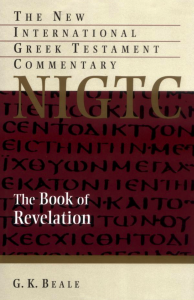The Book of Revelation: A Commentary on the Greek Text. The New International Greek Testament Commentary.
G. K. Beale. Grand Rapids, MI: Eerdmans, 1999.
ISBN: 978-0802871077
The Book of Revelation by G. K. Beale is a monumental work which was acclaimed by scholars, pastors, students, and serious learners of the Apocalypse. It is one of the finest commentaries on Revelation today and represents the best of current scholarship.
Summary and main points
The commentary offers a profound 1245 pages long verse-by-verse exegetical study. First 177 pages deal with the introductory questions. For instance, Beale addresses the authorship, purpose, text, structure, different interpretive approaches, and others. Next, Beale engages into robust discourse on the text. He believes that the key to the Revelation is John’s use of the imagery from the OT and the Jewish apocalyptic literature. If understood correctly, the background material provides valuable clues for interpreting Revelation.
The interpretive view of the commentary is eclecticism which Beale defines as a redemptive-historical form of modified idealism (p. 48). For him, the book does not discern any historical event except the second coming of Christ. To clarify, the visions of Revelation describe the spiritual battle between good and evil and not specific events. Thus, all visions of Revelation point to any and all events between the two advents of Jesus. In other words, the history between two advents is viewed as one unit “the interadventual age,” “the church age,” or “the latter days.” Accordingly, the visions cannot be limited by only one specific historical event but rather may have multiple historical applications within this period.
Personal opinion
I have used the book extensively while writing my thesis. Two points are worthy to mention. First, the commentary shares the scholarly dialogue and engages readers in a discussion. So one may get a feel of what others say. This being said, it does not have the latest opinions since it was published back in 1999. At the same time, the book is more than a summary of what was already said. So it leads to the second point. Second, the author offers his unique understanding of the text.
The commentary as the title suggests is the exposition on the Greek text. So the basic knowledge of Greek is preferable, however, a reader without any knowledge of Greek can manage the book as well. The material is quite academic and technical. In this light, this volume may not be best for a devotional reading. On the other hand, a serious researcher, a pastor, or a student will find it as the top reference work on the market.
Further, Beale’s background study is matchless. Above all, the commentary provides the best background information of Revelation’s imagery which truly brings the meaning of the text home. As a result a familiar may shine a new meaning in light of the OT allusions. Finally, this volume concludes with detailed indexes of modern authors and Biblical and other ancient writings, so it is easy to navigate.
Although, I personally disagree with the idealist approach to the Apocalypse, Beale’s eclecticism seems reasonable to an extent. The depth of the exegesis and the background materials make this commentary extremely useful. It has been one of the best commentaries on Revelation published in the past two decades.
Conclusion
In sum, this book is the ultimate commentary on Revelation. Its background information provides a solid foundation on which one may build. For this reason, every serious student of Revelation should consider this volume. I highly recommend it.
Recommended: Yes
My Rating: 5
Check the Amazon Rating
